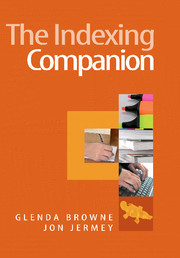Book contents
- Frontmatter
- Contents
- Foreword
- Preface
- 1 The Indexing Work Environment
- 2 Definitions and Standards
- 3 Planning Indexes
- 4 Concepts, Topics and Names
- 5 Selecting Terms
- 6 Controlled Vocabularies for Selecting Terms
- 7 Structuring Indexes
- 8 Quality Control and Interoperability
- 9 Specialised Source Material: Formats, Subjects and Genres
- 10 Software and Hardware
- 11 Threats and Opportunities in Indexing
- References
- Appendix: Selected websites
- Index
2 - Definitions and Standards
Published online by Cambridge University Press: 05 June 2012
- Frontmatter
- Contents
- Foreword
- Preface
- 1 The Indexing Work Environment
- 2 Definitions and Standards
- 3 Planning Indexes
- 4 Concepts, Topics and Names
- 5 Selecting Terms
- 6 Controlled Vocabularies for Selecting Terms
- 7 Structuring Indexes
- 8 Quality Control and Interoperability
- 9 Specialised Source Material: Formats, Subjects and Genres
- 10 Software and Hardware
- 11 Threats and Opportunities in Indexing
- References
- Appendix: Selected websites
- Index
Summary
THIS CHAPTER INCLUDES definitions of key indexing terms, and an overview of standards that are relevant to indexers.
Definitions
Here we define the key terms to do with indexing, especially some which are used in many ways. Specialist terms are defined in the sections they relate to, and are indexed under the topic.
Let us look at some typical index entries:
Daily Telegraph 20
Vote-line 27–28
Islam 33–39 see also Muslims
aggression condemned by 200–202
in construction of ‘Arab other’ 33
meeting hall see prayer centre application
terrorists identified with 28–32, 206
‘lost between cultures’ see culture clash
swimming pool exclusive hire 156
Vote-line see Daily Telegraph: Vote-line
We can define these entries as follows:
‘Islam’ is a heading, also called a main heading or main entry – the term chosen to represent an item or concept.
‘see also Muslims’ is a type of cross-reference, called a ‘see also reference’.
‘aggression condemned by’ is the first subheading under ‘Islam’. The three lines below are also subheadings; also known as subdivisions and subentries. According to the AS/NZS 999 standard (section 3.8), a subheading is a ‘heading that is subsumed under a heading to indicate a subordinate or modifying relationship’. A subheading may have one or more subsubheadings.
‘200–202’ is a locator – in this case a page number reference.
‘lost between cultures’ is a non-preferred term or entry point, that is, a term that is included in the index to lead you to another term.
‘see culture clash’ is a type of cross-reference, called a ‘see reference’.
[…]
- Type
- Chapter
- Information
- The Indexing Companion , pp. 26 - 36Publisher: Cambridge University PressPrint publication year: 2007



